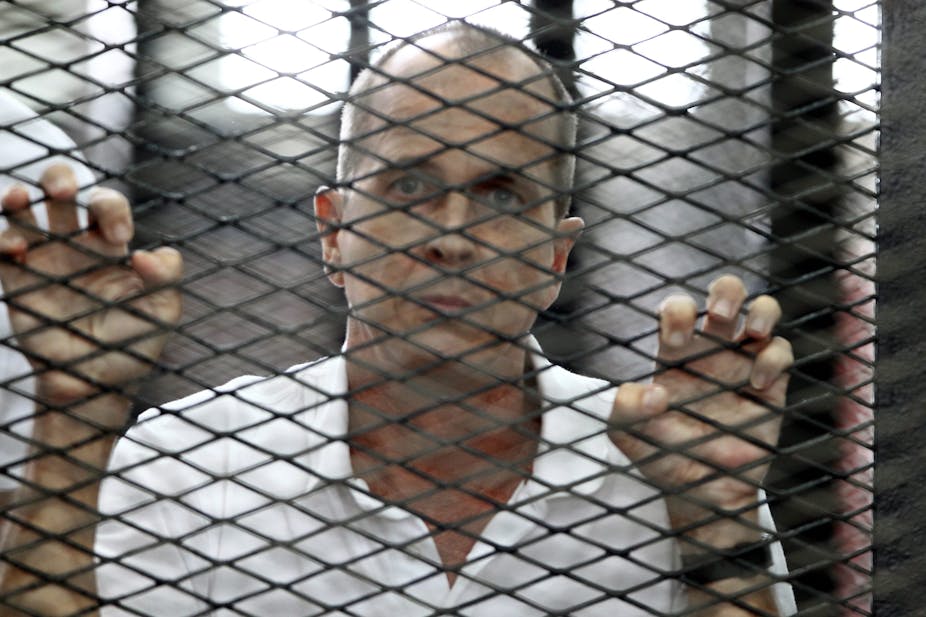The jail sentences handed down to Australian journalist Peter Greste and his Al Jazeera English colleagues have deeply shocked supporters in the west. While spending a few years in an Egyptian prison is nobody’s idea of a good time, what has been the most troubling aspect for many observers is the flimsiness of the evidence presented and the apparent lack of due process.
So why has this happened? What did Greste and his peers do that has landed them in this unhappy predicament? And why has this trial seemed so at odds with western expectations of justice?
The answers lie not so much with the individuals, but rather who they worked for. More importantly, the outcome is a reflection of the current political landscape in Egypt as the blowback from the 2011 revolution continues.
The Muslim Brotherhood’s fraternity
Unfortunately for the trio of journalists, they have been caught up in an Egyptian vendetta against the Al Jazeera network as whole. So while Greste the individual may not have been guilty of any wrong-doing, he is carrying the can for wrath directed at his employers.
As former Al Jazeera English journalist Scott Bridges pointed out in The Conversation earlier this year, the old guard of Egypt have had a paranoid obsession with Al Jazeera for a long time, seeing it as a fifth column for radical Islam.
That may sound strange to English-speaking followers of the Al Jazeera website, but the regimes in the Middle East are more focused on the various Arabic-speaking organs of the network. Here, editorial standards can be more rubbery, and there has been steady criticism of Al Jazeera’s one-sided support for ousted former president Mohammed Morsi in Egypt, as well as for the Sunni opposition in Syria.
Al Jazeera’s links to the Emir of Qatar largely explain this. Supporting the Muslim Brotherhood and the related groups that formed governments in the wake of the Arab Spring has been a key plank in a strategy aimed at bolstering the Emir’s domestic legitimacy and positioning his nation as an important player in the Arab world. It is a policy which has seen Qatar at growing odds with neighbours such as Saudi Arabia, causing serious rifts in the Gulf Co-Operation Council.
For the opposite side of Egyptian politics, Al Jazeera therefore represented a mouthpiece for the Morsi regime and a defiant challenge to the military’s counter-revolution of 2013. Constitutional clauses on press freedom were little impediment in a nation that has many decades of “state of emergency” mentality, where any challenge to the government is treated as treasonable.

Legal eagles
Once the Al Jazeera employees had become ensnared within the legal system the result was a foregone conclusion. Egypt’s legal Illuminati were the attacks dogs of the establishment during the interregnum between former president Hosni Mubarak and current president Abdel Fattah el-Sisi. They ran the ball up through the courts, challenging Morsi and the reformers at every turn.
By retarding the electoral, parliamentary and constitutional processes, they eventually frustrated Morsi to the point where he over-reached and tried to declare the presidency immune to the law, at least until a new constitution had been ratified.
It was an effective stalling tactic for the forces still loyal to Mubarak and the military. It meant that the Muslim Brotherhood made no progress in dealing with the irreconcilable economic and societal reforms that the initial revolution was centred on.
Coupled with Morsi’s tendency for nepotism and some dire warnings playing out in Libya and Syria, it wasn’t long before the crowds were back on the streets, fanned along by the military and the promise of a return to “stability”.
Part of this return to order has been the use of the courts to impose heavy penalties on anyone even remotely associated with the Muslim Brotherhood. That included Al Jazeera’s employees.
Regardless of Al Jazeera’s editorial policies, what seems unarguable is that the charges against Greste and his colleagues are false and unsupported by even a skerrick of evidence. The difficulty is that “unarguable” gets no traction when you’re not allowed to argue. Throughout the trial, the possibility of mounting a defence has been voided by a judicial process that can best be characterised as “ad hoc”.
There is a great deal of face-saving in this charade. Once the trial began, there was no real chance to stop matters proceeding to the tragic conclusion despite the lack of any tangible evidence. Trapped by their own rhetoric, had the Egyptian authorities dropped the charges they would have been open to the criticism they were under the influence of external parties: that the west, or Qatar, or the media or, worst of all, the Muslim Brotherhood, were calling the shots.
This was not an option for a new government elected on a “get tough” platform. The example they have made of Greste, Mohamed Fahmy and Baher Mohamed is a strong signal to the press in general, but Al Jazeera specifically.

Is there hope?
If there is a ray of hope in this story, it is that a seven-year stretch is lenient in comparison to the mass death sentences that have been handed down to hundreds of Egyptians by the same courts. This opens the prospect that after a suitable period of face-saving, Greste and his colleagues may be allowed free on some sort of appeal or clemency deal. However, that will be cold comfort for the accused and their families.
What this sorry affair does demonstrate is that journalism is not a safe profession in many parts of the world. We know about this Egyptian story because, somewhat atypically, it involves a western citizen. But for every web page we skim through covering the Middle East there are plenty of people, including locals, gathering and presenting that material. And, at any time, those people may be putting their life or liberty at risk to do that work.
And mostly, their sacrifices go unreported.

